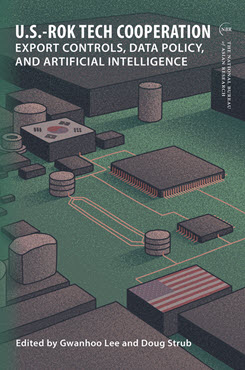Essay in NBR Special Report 107
U.S.-ROK Data Policy
Challenges and Opportunities
This chapter examines U.S. and South Korean approaches to data policy, including the barriers that arise from policy differences and the efforts made to find common ground and maximize cooperation.
EXECUTIVE SUMMARY
MAIN ARGUMENT
In the first section, Nigel Cory points to several areas where the data policies of the Republic of Korea (ROK) are more stringent than those in the United States and discusses how these policies can hinder cross-border digital commerce. He notes that South Korea has made progress through updates to its data regulations and suggests that the country’s growing participation in multilateral and plurilateral digital trade and economy agreements points toward further changes that align the ROK’s data policy with like-minded trading partners. Key to the ROK’s potential alignment is recognizing that less restrictive data regulations can better promote innovation and digital trade while still ensuring robust safeguards for the protection of personal data and national security.
In the second section, Nohyoung Park analyzes the impact of the 2023 amendments to South Korea’s Personal Information Protection Act (PIPA). Noting that South Korea was an early adopter of data protection policies and has established one of the most robust data protection regimes in the world, he argues that the country has since updated and liberalized these policies to better facilitate digital commerce and cross-border data flows while still maintaining its desire for high levels of personal information protection for South Korean citizens. The PIPA amendments seek to achieve this balance in a number of ways. Moreover, through the introduction of a reciprocity principle, these policies seek to encourage other countries to strengthen their data protection policies in ways that enable greater exchanges of data containing personal information across borders.
POLICY IMPLICATIONS
- Differing approaches to data security and protection, cross-border data flows, and related data policies in South Korea have in some cases acted as barriers to stronger U.S.-ROK digital relations. Greater alignment on data policy issues is essential, as both countries share similar values and are well-positioned to be leaders in emerging digital technologies.
- Bilateral engagement mechanisms have not addressed long-standing barriers to greater digital cooperation and have not kept pace with technological changes. Updating and expanding Track 1.5 and Track 2 engagements, as well as other dialogue mechanisms, to include the appropriate stakeholders and address the latest technological developments could help mitigate challenges arising from policy differences.
- Bilateral cooperation needs to move from being reactive to proactive in identifying and talking about new data and technology policy issues. Early engagement helps ensure that each country’s respective responses are not only aligned but reinforcing, and do not create new barriers to data and high-tech trade.
Nigel Cory is an Associate Director covering trade policy at the Information Technology and Innovation Foundation and a Nonresident Fellow at the National Bureau of Asian Research.
Nohyoung Park is a Professor of Law at Korea University School of Law (KULS). Dr. Park would like to thank Sukhyun Jung, a research assistant at KULS, for her assistance with his section.



